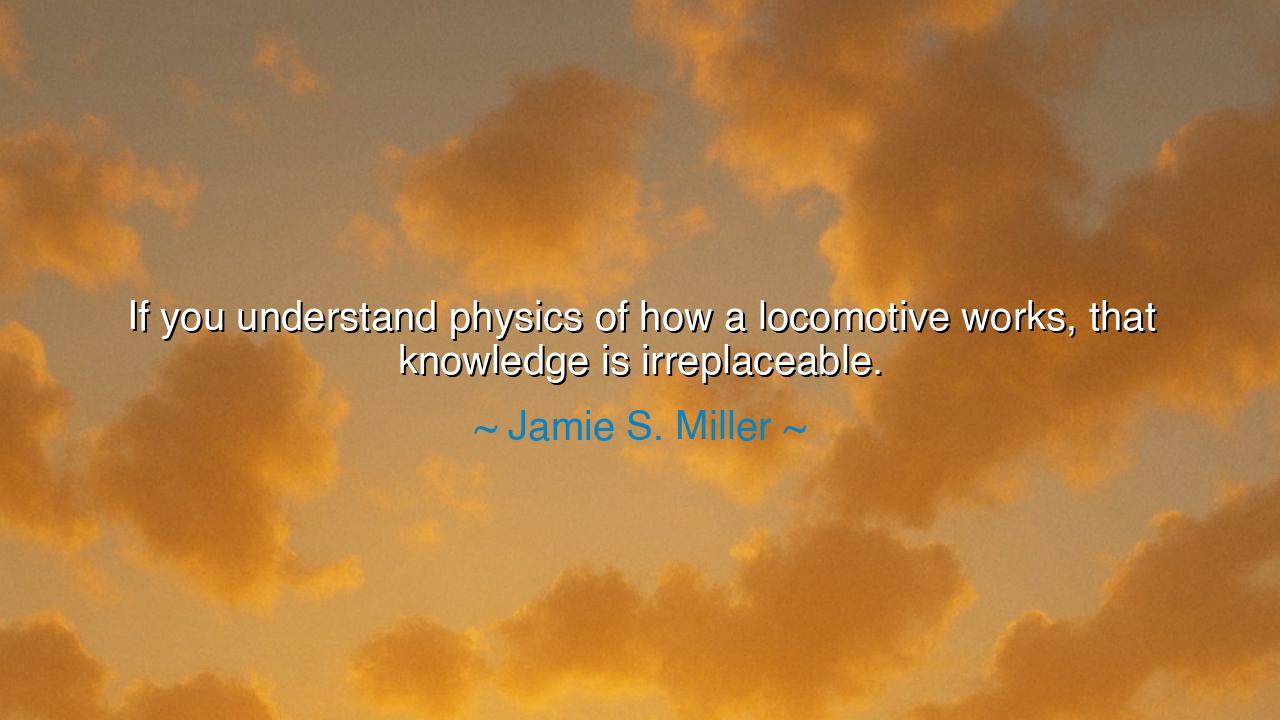
If you understand physics of how a locomotive works, that






Jamie S. Miller once spoke with clarity and weight: “If you understand physics of how a locomotive works, that knowledge is irreplaceable.” At first, the words seem simple, but beneath their surface lies a fountain of wisdom. The locomotive, that mighty engine of steel and fire, becomes in this saying a symbol of all human invention and of the deeper truths that govern the world. For to understand not only the surface of things, but the physics, the very principles by which they move and live, is to hold in one’s hand knowledge that cannot be taken away, copied cheaply, or diminished by time. Such understanding is not borrowed—it is earned, and it is eternal.
The ancients spoke often of mastery, but mastery was never the mere repetition of tasks; it was the grasping of first principles. To know how a thing works is to hold the key to its soul. Just as a shipwright must understand not only how to cut wood but how the winds and waves obey hidden laws, so too must the builder of engines grasp the unseen forces of motion, energy, and consequence. Miller reminds us that it is this depth of knowledge—the irreplaceable foundation—that cannot be faked. Tools may break, manuals may be lost, but the one who truly knows can always rebuild, always solve, always create.
Consider the story of George Stephenson, called the “Father of Railways.” He was no university scholar but a colliery worker who taught himself to read and to study mechanics at night. When he built his first locomotive, others doubted him. Yet because he understood the workings of pressure, steam, and motion—not as tricks, but as truths—he created machines that transformed the world. His knowledge was not second-hand; it was rooted in physics, and thus it was unshakable. This is what Miller meant: that to understand the foundation is to wield a power that endures.
Think too on the Wright brothers. Many attempted to fly before them, crafting wings and engines with reckless hope. They alone succeeded because they did not guess—they studied, they tested, they learned the laws of lift and drag. They built their own wind tunnel, measuring carefully, patiently, until knowledge—not luck—carried them into the sky. Their triumph was not in mere tinkering, but in understanding. Such knowledge, like the knowledge of the locomotive, was beyond price, for it could not be replaced by chance or fortune.
The lesson shines clearly: do not be content to learn the surface, the “how” alone. Seek always the why. Do not only memorize the steps of a craft, but grasp the forces that make those steps necessary. For when the world changes—and it always does—the one who knows only the ritual will be lost, but the one who knows the reason will adapt and prevail. The rituals may pass, but the principles remain eternal.
Practical wisdom flows from this: if you are a student, look beneath the lesson and ask what truth it rests upon. If you are a worker, strive not only to do the task, but to comprehend its heart. When you see a problem, ask not only how to fix it, but why it broke. In this way, you will build within yourself a treasure that no one can steal. This treasure—the irreplaceable knowledge of principles—is the foundation of mastery in every art, every science, every life.
So let the words of Jamie S. Miller echo as a guide: “If you understand physics of how a locomotive works, that knowledge is irreplaceable.” Do not chase only the outward form, but pursue the eternal laws that dwell beneath. In knowing them, you will not only command the locomotive—you will command yourself, your craft, your destiny. For the world belongs not to those who merely use, but to those who truly understand.






AAdministratorAdministrator
Welcome, honored guests. Please leave a comment, we will respond soon